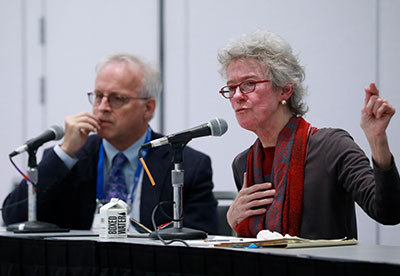Psychiatrists Have Role to Play in Building Bridges Between Today’s Polarized Society

Back in 2011, Arlie Russell Hochschild, Ph.D. (pictured on right), professor emerita of sociology at UC Berkeley, decided to explore the rising polarization in American society. The quest landed her in Louisiana, the heart of what she came to call the Red State Paradox. Why is it that the poorest states—the ones that have the lowest education, the worst health outcomes, the most pollution, and the lowest life expectancy and that get more money per capita from the federal government—revile that same government and vote for politicians who appear to want to limit it even more?
Hochschild spoke on Monday at a session sponsored by the American Association for Social Psychiatry. Her conversations over five years led to her book, Strangers in Their Own Land: Anger and Mourning on the American Right, and some insights into both her subjects’ and her own views of the world.
The people with whom she spoke identified with the Tea Party, a branch of the Republican party that favors lower taxes and less government spending. They felt that their fellow citizens in big coastal cities looked down on them and saw them as “prejudiced, backward, and fat.” They felt their whole way of life was being put down. These were not the poorest of the poor, but people who were doing OK economically but were in sectors that were hurt by the modern world.
Why did they vote in ways that seemed opposed to their own interests, at least to an outsider? Hochschild talked to people who lived not far from badly polluting petrochemical plants. Although they enjoyed hunting, fishing, and being outdoors, they did not support government efforts to protect the environment or themselves.
Hochschild came to see their psychological reasoning, based on a sense of honor. They embraced stoicism, priding themselves on being tough in a tough world. They were “worshipers of renunciation”—“Nature was God’s creation, but we don’t get to have what we want” was their view. And since Republicans discounted the environment and these individuals were Republicans, they felt it was their job to be part of the team.
In 2016 (and since), Donald Trump played to their sense of shame and their reserves of pride in their way of life, said Hochschild. “He delivered a sense of rescue with deeply emotional appeals to their values.”
Hochschild saw two divergent “deep stories” setting the stage for both right and left. The right viewed themselves as waiting patiently in line for their just rewards, only to be elbowed aside by “line jumpers”—people like African Americans, women, and immigrants—who were unjustly moving ahead of them. Liberals, in contrast, saw their world not as a line but as a public square, with amenities like schools and museums accessible to all.
Is there a way to bridge that gap? asked Hochschild. “I’m an optimist, but I’m also a pragmatist. This is a moment for bridge builders on both sides. We need people who know how to mediate, listen, and deal with emotions when they feel threatened.”
There is a role for psychiatry in that work, said discussant Kenneth Thompson, M.D., a clinical assistant professor of psychiatry at the University of Pittsburgh and past president of the American Association for Social Psychiatry.
“Psychiatrists must not only understand our patients as individuals but also as members of the communities and social world they live in,” he said. “We have to dialogue and participate in that as social actors. Anything we can do to help people find some common understanding—some bridge-building in attitudes—will hopefully mitigate the conflicts and challenges that we are inevitably going to be facing.”
(Image: David Hathcox)
|
|
|
|
|

